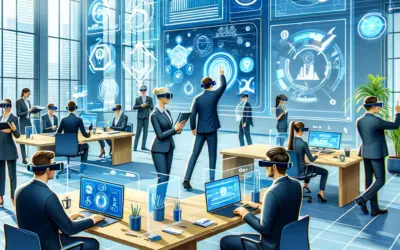Understanding the Metaverse: A New Horizon for Corporate Brands
Understanding the Metaverse: A New Horizon for Corporate Brands
Building Virtual Communities
Community building has been a cornerstone of brand loyalty, but in the Metaverse, it takes on a new form. Corporate entities are designing engaging environments where consumers can not only explore products but also forge meaningful connections. This sense of community and belonging is pivotal, as it fosters a deeper emotional investment in the brand.
Interactive Marketing in the Age of the Metaverse
Interactive marketing is undergoing a transformation as the Metaverse redefines the way brands communicate with their clientele. Through avatars and virtual events, companies bring forward an interactive narrative which is both engaging and personalized. This approach caters to a generation that values authenticity and participatory experiences, encouraging a two-way dialogue rather than a unidirectional message delivery system.
Examples of Cutting-edge Campaigns
- Virtual try-on experiences for fashion and accessory brands.
- Immersive game-like interactions to showcase new product features.
- Creation of brand-specific virtual worlds for customers to explore.
Measuring Success in Immersive Brand Experiences
As corporate brands make headway into the Metaverse, quantifying success becomes critical. Traditional metrics evolve; now, the focus shifts towards user engagement, time spent in branded virtual spaces, and the quality of user interactions. Relevance in the Metaverse is gauged by how seamlessly a brand can integrate into the virtual community, adding value and excitement to the users’ experiences.
Key Performance Indicators (KPIs)
- Duration and frequency of engagement within the Metaverse environments.
- The intensity of social interactions surrounding brand events.
- Conversion rates from virtual world engagements to real-world purchases.
How Businesses Are Building Their Brand in the Metaverse
Understanding the Metaverse: A New Frontier for Branding
The metaverse, a collective virtual shared space created by the convergence of virtually enhanced physical reality, augmented reality (AR), and the internet, is fast becoming a hotbed for brand innovation. Businesses are exploring this burgeoning digital landscape as a place to build and expand their brands. The metaverse offers an immersive experience that goes beyond traditional marketing, enabling users to interact with products and services in a three-dimensional environment. This unprecedented level of engagement is what businesses are tapping into, aiming to create memorable experiences that resonate with their target audience.
Establishing a Virtual Presence
For businesses, establishing a firm foothold in the metaverse involves creating appealing and interactive virtual spaces. These spaces, often designed as digital twins of their physical counterparts or as entirely unique virtual experiences, serve as hubs for engagement, showcasing products, and hosting events. The key is to create something that not only reflects the brand’s identity but also enhances the users’ experience by leveraging the unique features of the metaverse, such as real-time interaction and three-dimensional exploration.
Interacting with Customers in Novel Ways
Brands are no longer limited to one-way communication; in the metaverse, the interplay between customer and company is dynamic. Through the use of avatars, customers can engage with brands on a more personal level, allowing for a deeper connection to be made. Businesses utilize this interaction to gain valuable feedback, test out new concepts, and foster a community around their brand—all in real time.
Incorporating Innovative Technologies for Enhanced Brand Experience
With virtual reality (VR) and AR at its core, the metaverse enables brands to push the boundaries of innovation. Technologies such as blockchain and AI are being employed to develop secure, customized experiences for users. For instance, blockchain technology ensures authenticity and ownership of digital assets, which can be crucial for luxury brands venturing into the creation of exclusive virtual goods. Similarly, AI helps in personalizing experiences for users, enhancing brand engagement, and ensuring that each user feels valued within the virtual space.
Exploring Digital Goods and Virtual Services
Brands are not just marketing their physical goods in the metaverse, but are also creating digital counterparts and virtual-exclusive products. These range from wearable fashion items for avatars to NFTs (non-fungible tokens) that represent ownership of unique digital art. Offering virtual services, such as exclusive events or consultations in a branded virtual environment, adds an additional layer to the customer’s journey, making the brand experience more comprehensive and immersive.
Leveraging the Metaverse for Community and Loyalty Building
Businesses are quickly recognizing the importance of community in the digital age. The metaverse provides a platform where loyalty and community can flourish through shared experiences. Companies are crafting these shared spaces to host events, such as product launches or community gatherings, where users can interact not just with the brand but also with one another. This interaction fosters a sense of belonging and loyalty, turning users into brand ambassadors.
Creating Exclusive Experiences
To differentiate themselves and to deepen customer loyalty, brands are offering exclusive experiences in the metaverse that can’t be found elsewhere. From limited edition releases to early access to new products or services, these experiences generate buzz and foster a sense of exclusivity. Engaging storytelling and high-quality, immersive visuals aid in cementing the brand’s narrative within the minds of the metaverse users, enhancing recall and affinity.
Metaverse Corporate Presence: Opportunities and Challenges
The rise of the metaverse has ushered in a new era for corporate presence, providing a myriad of opportunities for businesses to innovate and interact with their audiences in unprecedented ways. With fully immersive virtual environments, companies can create more engaging and interactive brand experiences. The metaverse allows businesses to virtually extend their operations, offering products and services through digital avatars and spaces, which leads to tremendous potential for growth and customer outreach. However, establishing a corporate foothold in such a dynamic and evolving landscape is not without its hurdles, as companies must navigate the technological, ethical, and logistical challenges that accompany this digital frontier.
Expanding Brand Horizons through Immersive Experiences
One of the most significant opportunities presented by the metaverse is the ability for businesses to craft immersive brand experiences. Through virtual reality (VR) and augmented reality (AR), companies can develop interactive product demonstrations, simulations, and events that engage customers on a deeper level than traditional media. By creating virtual showrooms and interactive elements, companies can showcase their products in a comprehensive and engaging way, allowing customers to experience them in a controlled, hyper-realistic setting before making a purchase.
Enhancing Customer Interactions and Community Building
Building a robust online community has never been more interactive and effective as it is within the metaverse. The platform provides a unique space for customers to interact with brands and with each other. This leads to the creation of vibrant communities built around products, services, or the brand itself. By leveraging virtual events and environments, businesses can foster a sense of belonging and loyalty among their customers, encouraging engagement and providing a space for feedback and co-creation. Brands that embrace this collaborative approach are poised to benefit from increased customer retention and a stronger brand image.
Facing Technological, Ethical, and Logistical Challenges
Despite the allure of the metaverse, companies face real challenges that can impact their corporate strategy and brand reputation. Firstly, the technological infrastructure needed to create and maintain a metaverse presence is complex and can be costly. Access to cutting-edge hardware and software, as well as the expertise to utilize them effectively, can pose barriers to entry for some businesses. Additionally, ethical considerations, such as data privacy and user security, are paramount in any digital landscape but are amplified in the highly interactive metaverse. Establishing transparent practices and safeguards is crucial for maintaining consumer trust. Lastly, companies must consider the logistics of navigating a virtual space that operates by its own set of rules and norms, including managing digital assets, integrating e-commerce capabilities, and staying attuned to the ever-evolving user expectations and technological advancements within the metaverse.
Case Studies: Successful Corporate Ventures in the Metaverse
Nike’s Digital Transformation: Blazing Trails into the Metaverse
Nike, the sportswear giant, made headlines with its innovative leap into the metaverse through the acquisition of RTFKT, a virtual sneaker company. This strategic move allowed Nike to carve out a space within the digital frontier. With an eye for the future, Nike transformed our understanding of branding by launching digital products and immersive experiences, tapping into a new market of tech-savvy consumers. The brand’s virtual designs have been met with widespread acclaim, showcasing how traditional companies can thrive in the metaverse landscape.
Gucci and Luxury Fashion’s Virtual Frontier
The iconic luxury brand Gucci has successfully transcended the physical realm by venturing into the metaverse with its «Gucci Garden» experience. This bold initiative, available on platforms like Roblox, brought Gucci’s fashion to the virtual world. By selling digital items, along with experiences that align with their opulent branding, Gucci managed to expand their consumer base significantly. Their metaverse endeavor has been a stunning example of how luxury brands can preserve their exclusivity and prestige, while innovating within digital spaces.
Metaverse Real Estate: The Virtual Land Boom
Beyond garments and accessories, corporate ventures into the metaverse are not complete without mentioning the virtual real estate boom. Companies like Metaverse Property have pioneered the commercialization of digital land, mirroring the real-world real estate market. These properties host events, advertisements, and virtual hangouts, generating actual income streams. Such case studies are paramount in illustrating the metaverse’s potential as an investment platform for businesses and individuals alike.
The Entertainment Sector’s Metaverse Migration
Lastly, the entertainment industry’s shift toward the metaverse has been nothing short of revolutionary. High-profile concerts and events, such as those headlined by global megastars in platforms like Fortnite, have set a precedent. They exemplify how live events in the metaverse can achieve unparalleled reach and connectivity. Media companies have recognized this and are now aiming to hold their major events in these digital spaces, further bridging the gap between virtual and physical entertainment.
Future-Proofing Businesses: Preparing for a Metaverse-Integrated Market
Understanding the Metaverse: A New Digital Frontier
The concept of the metaverse is rapidly transforming from science fiction into a digital reality. As businesses, it’s vital to grasp the essence of this virtual space. The metaverse is a collective virtual shared space, created by the convergence of virtually enhanced physical and digital reality. It’s a network of 3D worlds and simulations that support continuity of identity, objects, history, payments, and entitlements. Embracing the metaverse means tapping into a world of endless opportunities for innovation, customer engagement, and revenue streams.
Key Features of the Metaverse
- Persistent existence: The metaverse exists continuously and operates in real time.
- Interoperability: Assets and information can move seamlessly between different experiences or platforms.
- User-generated content: Users can create, own, and monetize their creations.
- Accessibility: It’s accessible to anyone, anywhere, provided they have an internet connection.
Strategies for Integrating Your Business into the Metaverse
To integrate your business into the metaverse successfully, you need a robust strategy that aligns with your core values and customer needs. Begin by identifying your target audience in the metaverse and understand the platforms they frequent. Research competitors who are already immersed in the metaverse and learn from their approaches. Establish a strong virtual presence that reflects your brand’s identity through virtual storefronts or interactive experiences.
Adapting to Metaverse Marketing
Marketing in the metaverse will require a unique blend of creativity and technology. Traditional marketing strategies need to be reimagined for a three-dimensional, interactive environment. This might include in-world events, sponsored virtual items, or exclusive digital content. Virtual and augmented reality could play pivotal roles in product demonstrations and customer interactions. Engagement will be key, and providing value within the metaverse itself can foster community and brand loyalty.
Technological Investments and Partnerships
Future-proofing your business for a metaverse-integrated market also means investing in the right technology. Virtual reality (VR) hardware, augmented reality (AR) software, and blockchain technologies are fundamental to participate in the metaverse meaningfully. Training your workforce to understand and utilize these technologies is equally important as the technical investments themselves. Additionally, forging partnerships with tech companies and other stakeholders in the metaverse can accelerate your integration process and expand your digital footprint.
Security and Privacy in the Metaverse
As businesses move into the metaverse, protecting customer data and ensuring safe transactions become paramount. Investing in cybersecurity measures is non-negotiable. Transparent privacy policies and secure payment systems will be critical in establishing trust with your metaverse customers. It’s important to stay ahead of evolving regulations and compliance standards in this nascent digital ecosystem.













0 comentarios